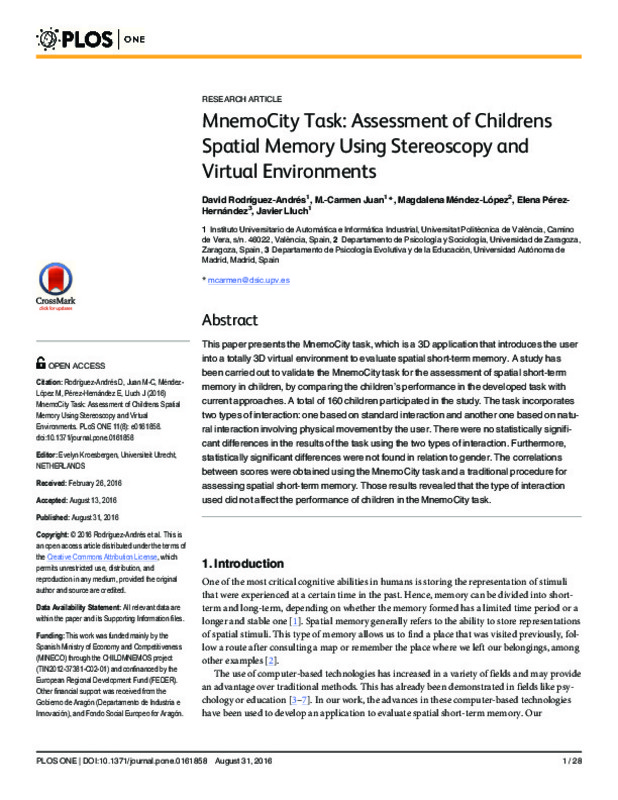JavaScript is disabled for your browser. Some features of this site may not work without it.
Buscar en RiuNet
Listar
Mi cuenta
Estadísticas
Ayuda RiuNet
Admin. UPV
MnemoCity Task: Assessment of Childrens Spatial Memory Using Stereoscopy and Virtual Environments
Mostrar el registro completo del ítem
Rodríguez-Andrés, D.; Juan, M.; Mendez Lopez, M.; Pérez Hernández, E.; Lluch Crespo, J. (2016). MnemoCity Task: Assessment of Childrens Spatial Memory Using Stereoscopy and Virtual Environments. PLoS ONE. 11(8):1-28. https://doi.org/10.1371/journal.pone.0161858
Por favor, use este identificador para citar o enlazar este ítem: http://hdl.handle.net/10251/88166
Ficheros en el ítem
Metadatos del ítem
| Título: | MnemoCity Task: Assessment of Childrens Spatial Memory Using Stereoscopy and Virtual Environments | |
| Autor: | Rodríguez-Andrés, D. Mendez Lopez, Magdalena Pérez Hernández, Elena | |
| Entidad UPV: |
|
|
| Fecha difusión: |
|
|
| Resumen: |
[EN] This paper presents the MnemoCity task, which is a 3D application that introduces the user into a totally 3D virtual environment to evaluate spatial short-term memory. A study has been carried out to validate the ...[+]
|
|
| Palabras clave: |
|
|
| Derechos de uso: | Reconocimiento (by) | |
| Fuente: |
|
|
| DOI: |
|
|
| Editorial: |
|
|
| Versión del editor: | http://doi.org/10.1371/journal.pone.0161858 | |
| Código del Proyecto: |
|
|
| Agradecimientos: |
This work was funded mainly by the Spanish Ministry of Economy and Competitiveness (MINECO) through the CHILDMNEMOS project (TIN2012-37381-C02-01) and confinanced by the European Regional Development Fund (FEDER). Other ...[+]
|
|
| Tipo: |
|









